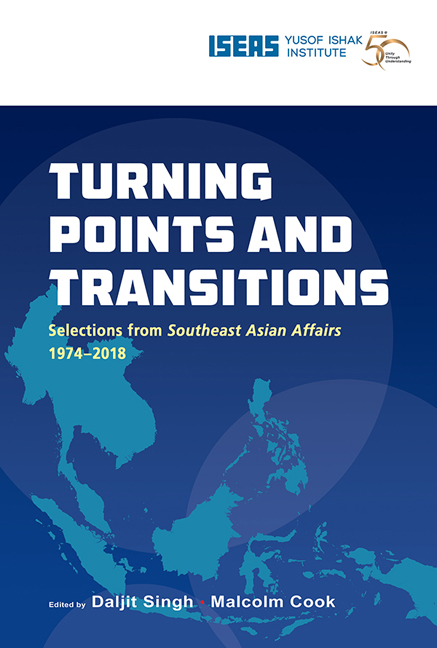Book contents
- Frontmatter
- Contents
- Message from the Director
- Foreword
- Foreword
- Introduction
- THE REGION
- BRUNEI
- CAMBODIA
- INDONESIA
- Indonesia's Armed Forces: Rejuvenation and Regeneration (1982)
- Indonesia: The Pancasila State (1985)
- The Indonesian Economy Facing the 1990s: Structural Transformation and Economic Deregulation (1990)
- A Year of Upheaval and Uncertainty: The Fall of Soeharto and Rise of Habibie (1999)
- Indonesia: The Regional Autonomy Laws, Two Years Later (2003)
- The Impact of Domestic and Asian Regional Changes on Indonesian Foreign Policy (2010)
- ISIS in Indonesia (2015)
- LAOS
- MALAYSIA
- MYANMAR
- THE PHILIPPINES
- SINGAPORE
- THAILAND
- VIETNAM
A Year of Upheaval and Uncertainty: The Fall of Soeharto and Rise of Habibie (1999)
from INDONESIA
Published online by Cambridge University Press: 29 May 2019
- Frontmatter
- Contents
- Message from the Director
- Foreword
- Foreword
- Introduction
- THE REGION
- BRUNEI
- CAMBODIA
- INDONESIA
- Indonesia's Armed Forces: Rejuvenation and Regeneration (1982)
- Indonesia: The Pancasila State (1985)
- The Indonesian Economy Facing the 1990s: Structural Transformation and Economic Deregulation (1990)
- A Year of Upheaval and Uncertainty: The Fall of Soeharto and Rise of Habibie (1999)
- Indonesia: The Regional Autonomy Laws, Two Years Later (2003)
- The Impact of Domestic and Asian Regional Changes on Indonesian Foreign Policy (2010)
- ISIS in Indonesia (2015)
- LAOS
- MALAYSIA
- MYANMAR
- THE PHILIPPINES
- SINGAPORE
- THAILAND
- VIETNAM
Summary
On 21 May 1998 Soeharto announced that he was unable to continue leading the nation and had decided to step down. His deputy, B.J. Habibie, was immediately sworn in as the new President. This dramatic threeminute event ended the Soeharto era. It was the culmination of several dramatic months of rising political violence and protest, but failed to usher in a much hoped-for era of political stability.
Economic Crisis
The Indonesian economy deteriorated rapidly following the onset of the regional economic crisis that began in the middle of 1997 in Thailand. Indonesia, forced to accept a US$43 billion bail-out under the International Monetary Fund (IMF) in September, was the hardest hit by the crisis. The value of the rupiah dropped from Rp 2,350 per U.S. dollar in June 1997 to Rp 16,500 in January 1998. By early April, it was back to Rp 9,000 per U.S. dollar. However, the low value of the rupiah made it impossible for Indonesian companies to import goods and to pay debts. Prices of imported and domestic products rose drastically and many companies faced bankruptcy. Unemployment rates also jumped. These developments affected Indonesian politics. The presidential election in March was conducted under the shadow of economic turmoil and increasing discontent.
There were two interpretations of the economic crisis in Indonesia. The government view was that the causes were mainly economic. The problems could be solved by undertaking economic reforms. The situation would then improve, and political reforms would not be required.
The other view was that the crisis was both economic and political in nature. Economic problems included overexpansion of the Indonesian economy without sound infrastructure, overuse of foreign investments in non-productive sectors (for example, real estate), and rampant corruption and cronyism, which resulted in large debts being incurred by both private (US$74 billion) and state (US$63.4 billion) sectors. Indebted private companies were mostly owned by the New Order élite and Chinese conglomerates. Many argued that this was the root of the problem.
Rampant Corruption
Under authoritarian rule, the power of the Indonesian state was strong, and it was concentrated in the hands of Soeharto. The spoils distribution system was used to co-opt the élite. When there was enough money to distribute, and the economy was healthy, the situation appeared to be stable.
- Type
- Chapter
- Information
- Turning Points and TransitionsSelections from Southeast Asian Affairs 1974-2018, pp. 310 - 325Publisher: ISEAS–Yusof Ishak InstitutePrint publication year: 2018



